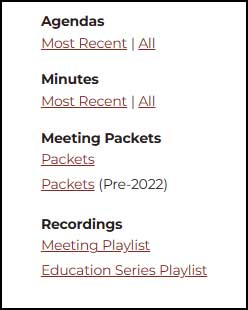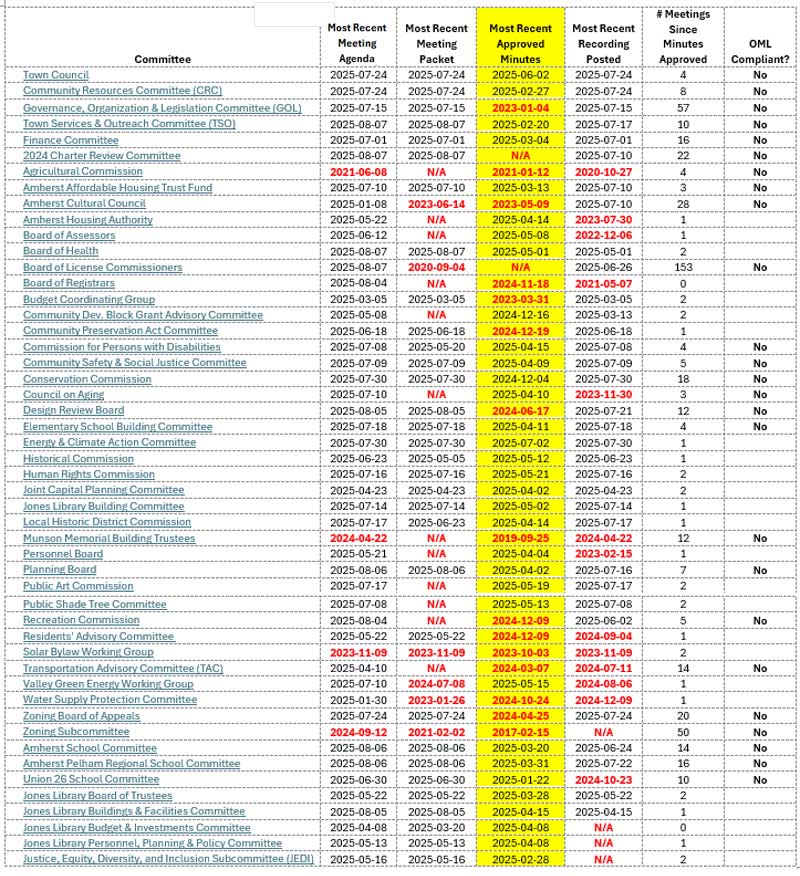Amherst Indy Audit Flags Deficiencies in Reporting by Town Boards

Photo: istock
Half of Postings of Meeting Minutes Fail to Meet Massachusetts Timeliness Standards
This week The Amherst Indy conducted an informal audit of the records – agendas, meeting packets, minutes and video recordings — posted to the town website at the home pages of the boards and committees that serve Amherst.
Citizens looking for documentation that support the town’s full calendar of public meetings may start by visiting the home page of the board or committee that is meeting. This page typically includes a short index with links to records that have been posted for past meetings. For example, an index for the Energy & Climate Action Committee appears in the right sidebar of the committee’s home page.

By inspecting the archives and conducting additional web searches when archive links were not listed, the Indy has compiled data on the completeness and currency of the meeting records of 49 town boards and committees. A summary of findings is shown in the spreadsheet below. It should be noted that the audit may have failed to locate meeting records that exist due to the town website links or archive folders being out of date.

25 Town Committees’ Minutes Don’t Meet Massachusetts Open Meeting Law Timeliness Standards
The 49 boards and committees examined qualify as public bodies and are subject to the requirements of the Massachusetts Open Meeting Law (OML). The law mandates that public bodies must create and approve minutes of all open session meetings in a timely manner.
An OML FAQ published at mass.gov states, “A ‘timely manner’ will generally be considered to be within the next three public body meetings or within 30 days, whichever is later, unless the public body can show good cause for further delay.”
The Amherst Indy audit found 25 committees that have not approved and posted meeting minutes within 30 days or three meetings. Overdue minutes are flagged in the OML Compliant? column of the spreadsheet.
The tardiness of minutes ranges from slightly late, as with the Amherst Affordable Housing Trust Fund which held its third meeting in July without yet approving minutes of its March 13 meeting, to committees like the Board of License Commissioners and Zoning Subcommittee of the ZBA that have not posted approved meeting minutes at all or in several years.
Further hindering access to information about public meetings is a lack of consistency in the design of the committee web pages. Some have no links to meeting minutes. Some have links to meeting documents embedded in the web page text rather than an easy-to-spot location such as the right sidebar.
But in general, it appears that an absence of a sense of urgency to approve draft minutes, the difficulty assembling a quorum qualified to vote on approving minutes (e.g. who were at the meeting in question), or the responsible individual being unable to write up and post the minutes are frequent causes of tardiness.
Why Should We Care?
The argument can be made that we should cut the Town and its committees some slack when it comes to publishing timely minutes. Most members conduct the business of Amherst as volunteers. Some committees are assigned paid notetakers to generate minutes, but many are not. And this audit has been done in the dead of summer when many people take vacations and the wheels of Amherst’s year-round government slow down.
And there are a couple ways a citizen can learn what transpires at meetings if willing to put in a little effort. Amherst or Amherst Media record almost all public meetings and usually post them to YouTube by the Friday after the meeting. YouTube generates a text transcript of all meetings uploaded there.
In addition, approved minutes, draft minutes, and even minutes of executive sessions are public records. A citizen can file a public record request with the Town Clerk and will receive the records, if they exist, within 10 business days. If for some reason the town does not comply, the state provides a straightforward procedure for appealing the denial to the Secretary of the Commonwealth.
See related: Town Council Dismisses Open Meeting Law Complaint
And of course, major meetings are covered in a timely manner in the Amherst Indy, often including information that would not be found in meeting minutes.
On the other hand, transparency and accountability are twin pillars of democracy. A healthy local government demands that what goes down at all public meetings, who argued what way, and what decisions were made, be as accessible and as widely understood as possible.
Consider this report a call to action for the Town of Amherst to get better at publishing timely minutes for all boards and committees, and to ensure that committee records are findable, complete and up to date on amherstma.gov.


Kudos to the Energy and Climate Action Committee for keeping residents abreast of their doings.
That is a great chart on town boards and committees, too. Thanks to Jeff Lee for compiling it. I have a couple of comments. Some of the committees are ad hoc, that is, they stopped meeting after their charge was fulfilled, like the Solar Bylaw committee and the School Building Committee. Some committees were disbanded, like the Zoning Subcommittee of the Planning Board, which disappeared soon after the Town Council’s Community Resource Committee usurped its power. The Planning Board now has a Housing Subcommittee, somehow comprised of 4 of its 7 members. The Manager and some of the Councilors have wanted to disband the all-resident Transportation Advisory Committee since the inception of the Council and it appears that will happen soon (if it hasn’t already) with the formation of a Transportation and Parking Commission that includes the Directors of Planning and DPW and the Police Chief as members in addition to residents. The Charter Review committee regularly approves minutes but somehow they haven’t gotten posted. The most egregious failures of minutes communication are with some of the most important committees – the Standing Committees of the Town Council – the Community Resources Committee, the Governance, Organization and Legislation Committee and the Finance Committee. Though people can watch the recordings, that takes a very long time. Minutes are much more easily accessible for people who want to find out what’s happening and don’t have two or more hours to watch a standing committee meeting.
Thanks for that background, Darcy. The Bylaw Review Committee and Redevelopment Authority were dropped from the audit as the terms of all members had expired and it was clear that the boards had been disbanded. I see that the terms of the Solar Bylaw Working Group and Zoning Subcommittee members have also expired, so thanks for that correction.
The Housing Subcommittee of the Planning Board needs to be added to the town’s list of “All Boards/Committees.” According to its home page, it has not approved minutes since seven meetings ago on December 17, 2024.
You raise a good point about the Charter Review Committee. Tardy minutes are not necessarily the fault of the committee, but may rest with the person tasked with uploading them to the town web server and adding links to the committee web page.
And minutes are not only more accessible and less time consuming than meeting recordings. They are also required by the Open Meeting Law.
Summer vacations? This is the excuse for “ZBA not publishing minutes for years”? Last time I checked summer is a period of approximately 90 days. Minutes from March should not still be due in July. Thank you Jeff Lee for pointing out that minutes are required by state public meeting law. The law, transparency and accountability, each good reasons on their own.